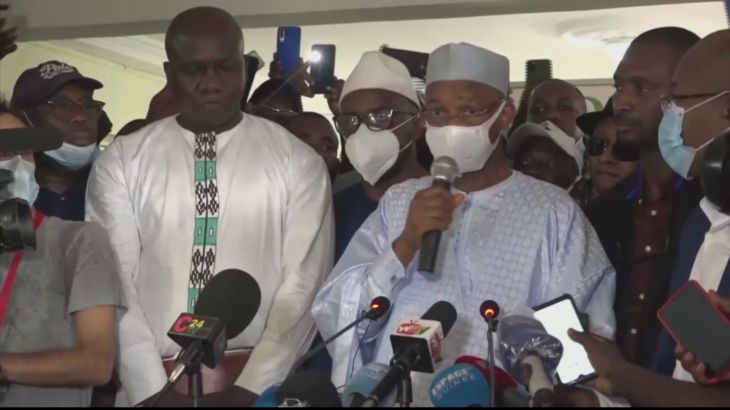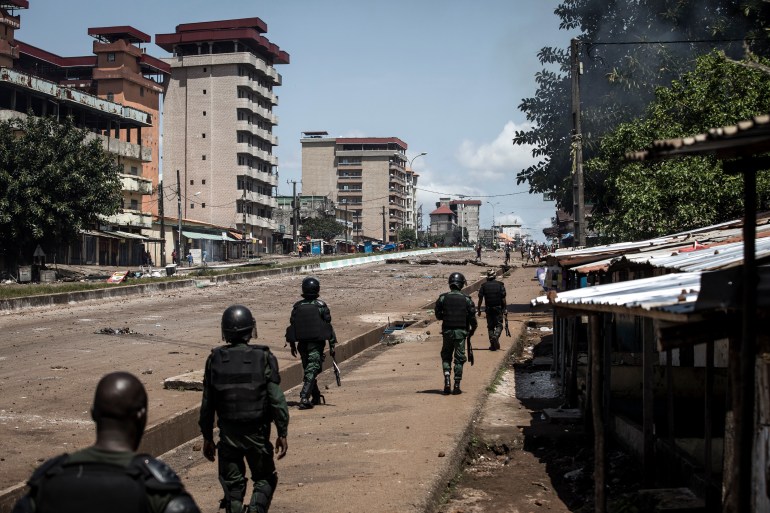Gunfire erupts in Guinea as president heads for third term
More than a dozen people were killed in clashes after preliminary results showed President Conde winning re-election.

Gunfire rang out across Guinea’s capital Conakry on Friday as security forces attempted to disperse protesters after results showed President Alpha Conde winning a high-stakes election that the opposition denounced as unconstitutional.
Conde, 82, won twice as many votes as his nearest rival, opposition candidate Cellou Dalein Diallo, with 37 of 38 districts counted, according to preliminary results from the election commission.
Keep reading
list of 4 itemsTimeline: A year of bloody protests in Guinea
Vote count begins in Guinea after tense election
Guinea: Diallo says he won round one, election body says no
The president’s decision to run for a third term has sparked repeated protests over the past year, resulting in dozens of deaths, including at least 17 in skirmishes since Sunday’s vote.
The International Criminal Court’s chief prosecutor warned on Friday that warring factions in Guinea could be prosecuted after fighting erupted.
“We are … continuing to closely monitor developments on the ground. The violence must stop,” Fatou Bensouda said in a tweet.
“I wish to repeat this important reminder: anyone who commits, orders, incites, encourages and contributes in any other way to crimes … is liable to prosecution either by the Guinean courts or the ICC,” she said.
Conde said a constitutional referendum in March reset his two-term limit, but his opponents said he was breaking the law by holding onto power.
Diallo’s camp said it has found evidence of fraud and will contest the result in the constitutional court.
‘Destroying everything’
Gunfire was heard on Friday in the Sonfonia neighbourhood of Conakry, where Diallo supporters clashed with security forces, witnesses said.
“There were warning shots. The police intervened to clear the barricades and disperse the demonstrators,” Oumar Camara, a resident, told Reuters news agency.
Diallo, who was prime minister under authoritarian leader Lansana Conte, has said security forces barricaded him inside his house.
Police also raided his party headquarters in Conakry, the opposition leader said this week, tweeting agents were “destroying everything”.
Security Minister Albert Damantang Camara confirmed the party’s premises had been “sealed off” under an open judicial order because “messages contrary to public order and national unity were broadcast”.
He said Diallo’s home was being guarded for “security reasons”, without elaborating.

Meanwhile, young people on Thursday erected barricades in the capital, knocked over rubbish cans, lit fires and hurled stones at police in riot gear who responded with gunfire, according to witnesses.
In other parts of the country, clashes broke out in the towns of Pita, Labe and Mali.
Saadou Nimaga, secretary-general of the mining ministry, said several train cars carrying fuel belonging to Russian aluminium producer Rusal were also attacked in Sonfonia.
Images shared on social media showed black liquid seeping out of fuel tanks.
Rusal said in a statement that supporters of an opposition candidate blocked the railway tracks and road it used to move bauxite, an aluminium ore, to port but traffic had since resumed.
Guinea has the world’s largest bauxite reserves.
‘End the violence’
In a statement, US Assistant Secretary of State for African Affairs Tibor Nagy called on all parties to end the violence and said election disputes should be resolved peacefully through legal channels.
Conde, a former opposition leader who was sentenced to death in 1970 by Marxist President Sekou Toure, finally won the top job in 2010. His election raised hopes for democratic progress in the country but critics say he has stifled dissent.
Diallo, 68, finished runner-up to Conde in the 2010 and 2015 elections.
Internet and phone access were severely disrupted on Friday, residents and digital rights groups said. Authorities in Guinea, as in much of sub-Saharan Africa, have in the past cut internet during times of unrest.
The government was not available to comment on internet access on Friday, but network data for monitoring group NetBlocks showed the internet was disrupted from 07:30 GMT on Friday morning, including on leading mobile operator Orange.